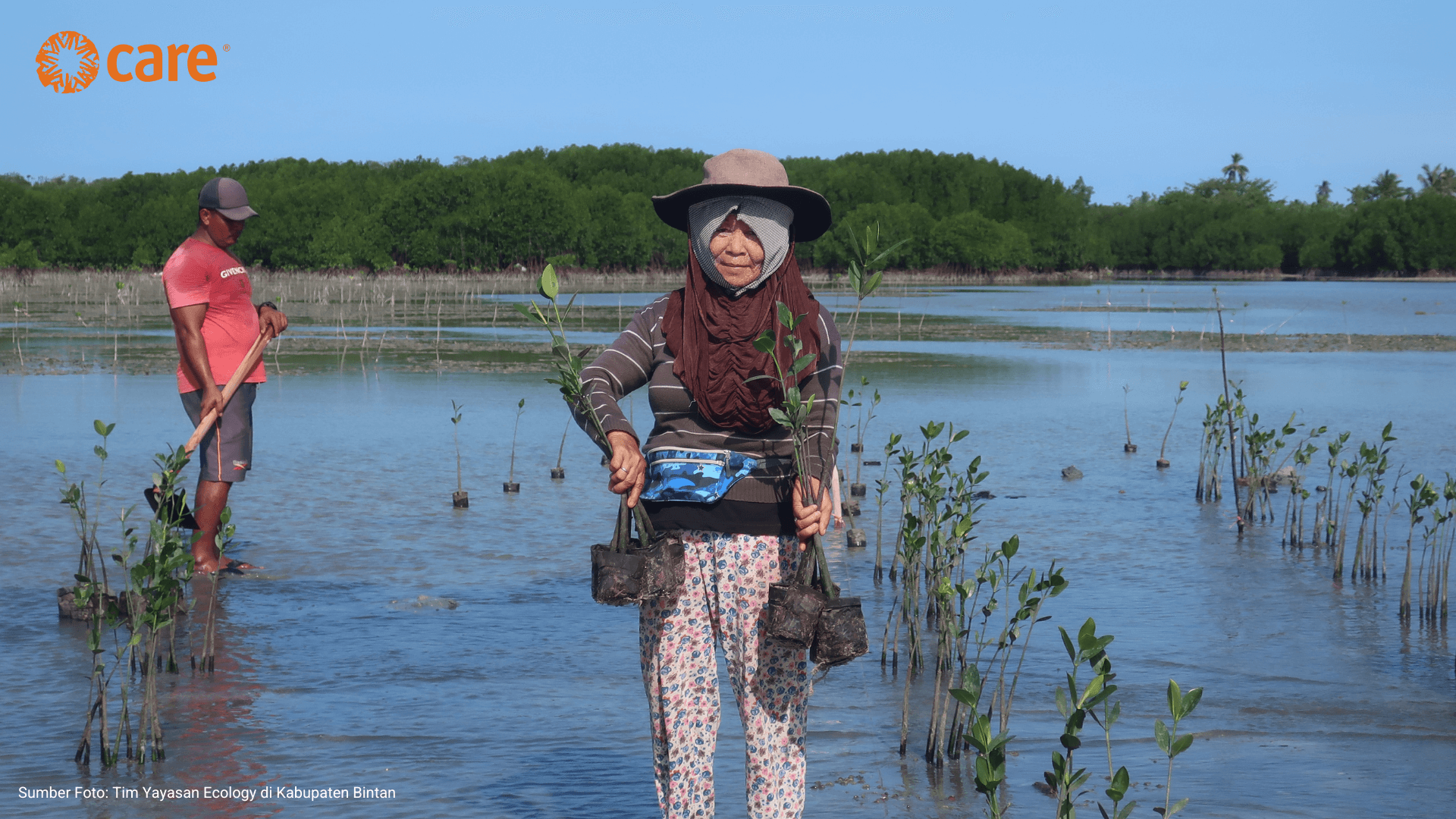Women emerge as the main drivers of food security and no longer hesitate to be active in the public sector.
Kause’s eyes lit up as she showed off harvesting her purple sweet potato crop. “Unlike other tubers that only grow during the rainy season, purple sweet potatoes can remain fertile during the dry season,” said the woman farmer from Oekiu Village, Nusa Tenggara Timor (NTT).
Growing it is also easy thanks to the drip irrigation technique. The used plastic bottle with a hole at the bottom is key to irrigating purple sweet potatoes. The water flows slowly onto the ground and the bottle only needs to be refilled once every three to four days. Purple sweet potato is easy to grow in the highlands and lowlands, hence strengthening food security of the villagers during the dry season and uncertain times. The nutritional content is also high.
Kause is a member of the Moen Mese Women Farmers Group (KWT) in Oekiu Village, one of the locations for Yayasan CARE Peduli (YCP)’s Partners for Resilience (PfR) program. The purple sweet potato farming assistance activity is part of the integrated risk management approach initiated by PfR. This approach is considered appropriate for dealing with the impacts of the climate crisis, strengthening ecosystem management and restoration, and promoting risk-resistant investments and policies from the private sector, government, and multilateral organizations.
NTT was chosen as the program location because of its vulnerable conditions to the climate crisis. The relatively dry climate causes low levels of land productivity, clean water availability and food security in NTT. As a result, NTT is one of the provinces with a large population classified as malnourished. In fact, more than a third of children under five years of age in NTT are underweight.

Women in NTT face a variety of challenges, ranging from food and sanitation problems, to limited public services and infrastructure. They are also usually tasked with fetching water and fuel for the family, which requires significant time and effort to travel long distances. Since most of their time is consumed in domestic work, women are hardly involved in public activities such as citizen meetings and development planning forums.
PfR seeks to encourage women farmers to be more empowered, have more access to information, and be actively involved in the decision-making process. Especially, in decisions related to food security and family nutrition.
“Purple sweet potato can fulfil our food needs. The excess harvest can also be sold in the market, providing additional income, ”said Yunyulita Lakilaf, also a KWT member Moen Mese.
Now, around 1,500 purple sweet potato trees are grown in Oekiu Village, which water supply tends to be limited. Purple sweet potato has become an important element to strengthen the food security of the villagers.
In addition to planting purple sweet potatoes, self-empowerment was also a material conveyed by the PfR facilitators to the women participating in the program. Women are encouraged to be actively involved in local decision-making processes, including in development planning, risk assessment and information management. Efforts to end hunger and poverty can provide optimum impacts only if they involve all parties, including women.
Thanks to PfR, there are now more women involved in the Development Planning Deliberations (Musrenbang) which are usually dominated by men. One of them is Regina, a resident of Oelbiteno Village, Kupang Regency. During the question and answer session of the Kupang Regency Musrenbang, she stood up swiftly and raised her hand to speak.
“I want to farm, but the village is short of water during the second planting season. I hope the government can build a retention basin (embung) to provide water. Apart from that, I also request that the elementary school and damaged roads in the village to be repaired, “she said.
The government immediately responded to Regina’s aspiration, and presented some of their plans. A retention basin will be built and the elementary school will be repaired. The related government unit office will immediately survey the damaged roads, while the work will be carried out in collaboration with village officials.
Since they are not used to public speaking, the resilient women who has participated in the PfR program admitted that they sometimes feel awkward. Ferderika Taimenas, Treasurer of the Women Farmers Group, for example. According to Ferderika, the important thing is that now they have the courage to do so.
“Previously, we did not dare to speak like this. Usually when there are guests, we are just busy in the kitchen. Now, even though talking stiffly, I dare to speak up,”she said with a smile.
Partners for Resilience (PfR)
Objective: Increase the resilience of vulnerable communities and protect livelihoods against natural hazards related to climate change
Duration: Phase 1 2011-2015, phase 2 2016-2020
Location: Kupang City, Kupang Regency, South Timor Tengah Regency
Number of beneficiaries: 1,686 people, 43% of whom were women
Implementing partner: Circle of Imagine Society (CIS) Timor
Consortium: International Federation of Red Cross (IFRC) / Indonesian Red Cross (PMI), Red Cross-Climate Center (RCCC), Wetlands International Indonesia (Yayasan Lahan Basah), KARINA Indonesia
Funding support: Dutch Ministry of Foreign Affairs





